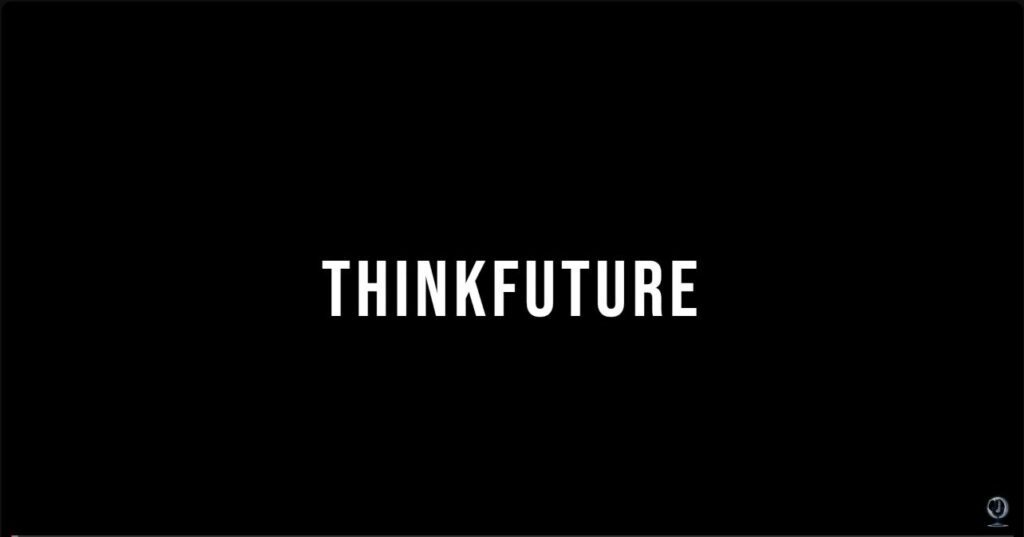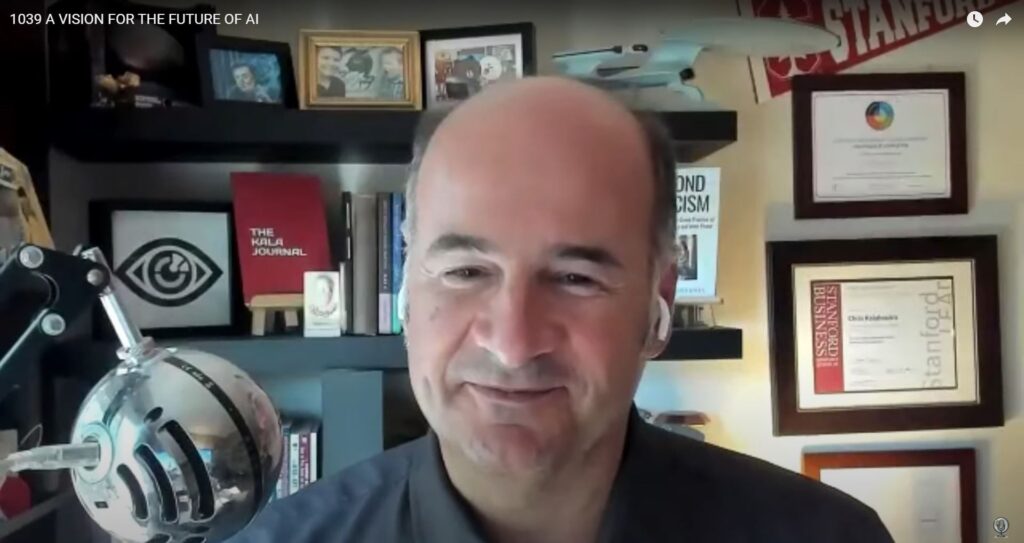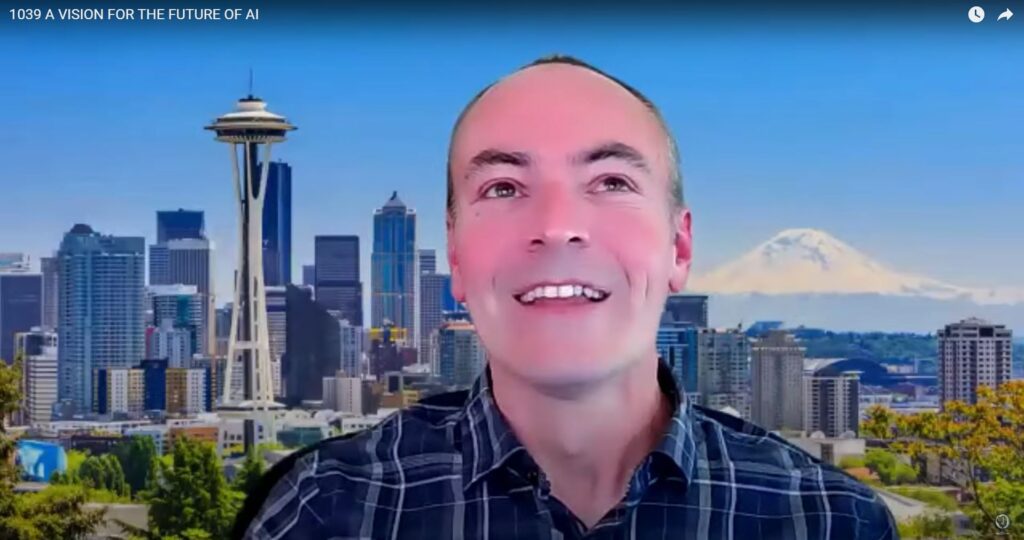
As someone who has spent years navigating the exciting and unpredictable currents of innovation, I recently had the privilege of joining Chris Kalaboukis on his show, Think Future. For those unfamiliar, Chris is a thought leader in the realms of foresight, philosophy, futurism, and innovation, and his show dives deep into ideas shaping tomorrow. Chris is also the author of Beyond Stoicism: Embracing The Ancient Greek Practice of Ataraxia for Tranquility and Inner Peace,which I recommend.
Our conversation, recorded on October 23, 2024, spanned topics ranging from the future of work and AI to the challenges and opportunities of disruptive technologies. It was a lively, engaging exchange of ideas, and I left the virtual studio feeling both inspired and recharged. In this article, I’ll reflect on my time on the show, share some of the highlights of our conversation, and offer a personal perspective on the big ideas we explored. The video contains quite a bit of my personal history and journey in all technologies along with some jokes.
As a worthy side note, my exact predictions for AGI were predicted 2 weeks later by Anthropic’s CEO, Dario Amodeion Lex Fridman’s show.
Kicking off with a thought experiment
Chris began the show with a quintessentially futuristic thought experiment, asking:
“Dan, if you could pick one technological advancement that would absolutely change the world in the next 10 years, what would it be, and why?”
It was the kind of question that could take hours to unpack, but I zeroed in on artificial intelligence (AI), specifically the next wave of generative AI systems. I told Chris that while we’ve seen incredible advances already, we are just scratching the surface of AI’s potential.
“We’re on the cusp of AI moving beyond being a tool for productivity,” I said, “to becoming a true collaborator, an entity that co-creates, learns, and evolves alongside us.”
Chris, ever the provocateur, pressed me to elaborate. Could AI really become a creative partner, or would it always be limited to a supporting role? My answer was rooted in optimism:
“I think the difference between tool and partner is a matter of perception and trust. If we design systems with empathy and usability in mind, we could forge partnerships with AI that unlock levels of creativity and problem-solving we’ve never seen before.”
That line of thought set the tone for much of our conversation, which revolved around how emerging technologies will reshape human roles and relationships in the coming decades.

The future of work: Augmentation, not replacement
No conversation about the future of technology is complete without addressing its impact on jobs, and Chris and I dove into this headfirst. He asked me a question that’s on everyone’s mind:
“Are we looking at a future where AI and automation replace humans entirely in the workplace?”
My answer was an emphatic no. While I acknowledged that certain tasks and roles would inevitably be automated, I argued that the larger trend points toward augmentation rather than replacement.
“The real opportunity,” I explained, “isn’t about replacing people but empowering them. AI can take over the repetitive, mind-numbing tasks that bog us down, freeing us to focus on work that demands creativity, empathy, and critical thinking.”
Chris chimed in with his own take, pointing out how history offers countless examples of technology creating new opportunities, even as it disrupts old ones. He cited the Industrial Revolution, where the rise of mechanized production initially displaced workers, only to later create entire industries and professions that no one had imagined.
Together, we speculated about the kinds of jobs that might emerge in an AI-driven world. I suggested roles like “AI ethicists” and “human-AI interaction designers,” while Chris proposed a new wave of creative professions enabled by generative AI, such as “virtual world architects” and “synthetic media storytellers.”
Disruption as an opportunity
The conversation shifted to a topic that’s near and dear to my heart: disruption. As an innovation consultant, I’ve worked with countless organizations grappling with the uncertainty and fear that disruption brings. Chris asked me a pointed question:
“How do you help companies not just survive disruption, but thrive in it?”
I shared a principle that I often return to in my work: disruption is only a threat if you view it as one. Instead, it’s an opportunity, a chance to reimagine your business, your processes, and even your purpose.
“The key,” I said, “is to embrace a mindset of continuous reinvention. Companies that are too attached to their current ways of doing things will struggle, but those that see disruption as a chance to evolve will come out stronger.”
Chris nodded in agreement, adding that this mindset shift is often the hardest part.
“It’s easy to say, ‘Let’s innovate,’ but when it comes down to actually challenging long-held assumptions, that’s where most organizations get stuck,” he observed.
We agreed that leaders play a critical role here, not just in setting the vision but in creating a culture where experimentation and failure are embraced as part of the process.

Ethical AI and the responsibility of innovators
One of the most compelling parts of our discussion centered on the ethical implications of AI and other emerging technologies. Chris asked me:
“Dan, where do you draw the line between innovation and responsibility? How do we ensure that the technologies we create are used for good?”
It was a question I’d wrestled with often, and my response came from a place of conviction.
“The line isn’t fixed, it’s something we have to continually negotiate as technology evolves,” I said. “But it starts with being intentional. We can’t treat ethics as an afterthought or a compliance checkbox. It has to be baked into the innovation process from the very beginning.”
Chris agreed, but he also pointed out the tension between innovation and regulation. In a fast-moving field like AI, regulations often lag behind technological advances, creating a kind of Wild West environment.
“So who’s responsible for setting the guardrails?” he asked.
My answer: everyone.
“It’s a collective effort,” I explained. “Governments, companies, and individuals all have a role to play. But as innovators, we have a special responsibility because we’re the ones building the future.”
A vision for the next decade
As our conversation wound down, Chris asked me to share my vision for the next decade. What kind of future did I see, and what role would innovation play in shaping it?
I described a world where technology amplifies our humanity rather than detracting from it, a future where AI isn’t just a tool but a trusted collaborator, where work is meaningful and fulfilling, and where we tackle big challenges like climate change and inequality with the same creativity and urgency we apply to technological breakthroughs.
“The next 10 years will be defined by our ability to align technology with our deepest values,” I said. “If we get that right, the possibilities are limitless.”
Chris closed the show with a sentiment that resonated deeply with me:
“At the end of the day, the future isn’t something that happens to us, it’s something we create. And conversations like this are how we start.”
Final thoughts
Looking back on my appearance on Think Future, I’m struck by how much ground we covered in just an hour. Chris has a unique ability to ask the kinds of questions that push you to think deeply and articulate your ideas in new ways.
For me, the experience was a reminder of why I do what I do: because the future is ours to shape, and the work of innovation is never done. If you’re interested in hearing the full conversation, I encourage you to watch the full episode. It’s entertaining as well as informative.
If you are a fan of the AI Think Tank Podcast, please also SUBSCRIBE to Chris’s wonderful show: Think Future.
Join us as we continue to explore the cutting-edge of AI and data science with leading experts in the field.
Subscribe to the AI Think Tank Podcast on YouTube. Would you like to join the show as a live attendee and interact with guests?
Contact Us